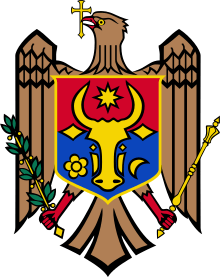Human rights in Moldova
 |
| This article is part of a series on the politics and government of Moldova |
|
Judiciary |
|
Executive
|
| Administrative divisions |
|
Foreign policy |
The condition of human rights in Moldova has come under scrutiny in recent years, and human rights organizations within Moldova and around the world have spoken out against what they feel to be unfair suppression of the independent media, as well as other abuses.
History
State media coverage of the street protests in 2002 regarding the Communists’ attempt to reinstate obligatory study of the Russian language and to defend the cultural identity that the majority of Moldovans share with neighboring Romania was censored. In February 2002, in response to severe censorship of the state broadcast station Teleradio-Moldova (TVM), hundreds of TVM journalists went on strike in solidarity with the anti-communist opposition. In retribution, a few journalists and staff members were dismissed or suspended from the station in March.[1]
However, in 2004 an improvement was made and the Moldovan Parliament removed Article 170 from the country's Criminal Code. Article 170 called for up to five years imprisonment for defamation.[2]
According to the Organization for Security and Co-operation in Europe (OSCE), the media climate in Moldova remained restrictive as of 2004.[3] Authorities continued a long-standing campaign to silence independent opposition voices and movements. In a case widely criticized by human rights defenders, opposition politician Valeriu Pasat was sentenced to a ten-year prison term. The United States and human rights defenders from the European Union consider him a political prisoner, and an official statement from Russia's Ministry of Foreign Affairs called the judgment "striking in its cruelty".
According to Amnesty International's 2007 annual report, the state of human rights in Moldova was poor. Torture and ill-treatment were widespread and conditions in pre-trial detention were poor. A number of treaties protecting women's rights were ratified, but men, women and children continued to be trafficked for forcible sexual and other exploitation. Measures to protect women against domestic violence were inadequate. Constitutional changes to abolish the death penalty were made. Freedom of expression was restricted and opposition politicians were targeted.
In 2009, when Moldova experienced its most serious civil unrest in a decade, several civilians like Valeriu Boboc were killed by police and many more injured.[4] According to Human Rights Report of the United States Department of State, released in April 2011, "In contrast to the previous year, there were no reports of killings by security forces. During the year reports of government exercising undue influence over the media substantially decreased." But "Transnistrian authorities continued to harass independent media and opposition lawmakers; restrict freedom of association, movement, and religion; and discriminate against Romanian speakers."[5] Moldova "has made “noteworthy progress” on religious freedom since the era of the Soviet Union, but it can still take further steps to foster diversity," said the UN Special Rapporteur on freedom of religion or belief Heiner Bielefeldt, in Chişinău, in September 2011.[6]
See also
References
- ↑ "Attacks on the Press 2002: Moldova". Retrieved 6 March 2015.
- ↑ "IFEX". IFEX. Retrieved 6 March 2015.
- ↑ Report on Assessment Visit to Moldova by the OSCE Representative on Freedom of the Media
- ↑ Bureau of Diplomatic Security, Moldova 2011 Crime and Safety Report
- ↑ United States Department of State, 2010 Human Rights Report: Moldova
- ↑ Moldova: UN human rights expert calls for more fostering of religious diversity